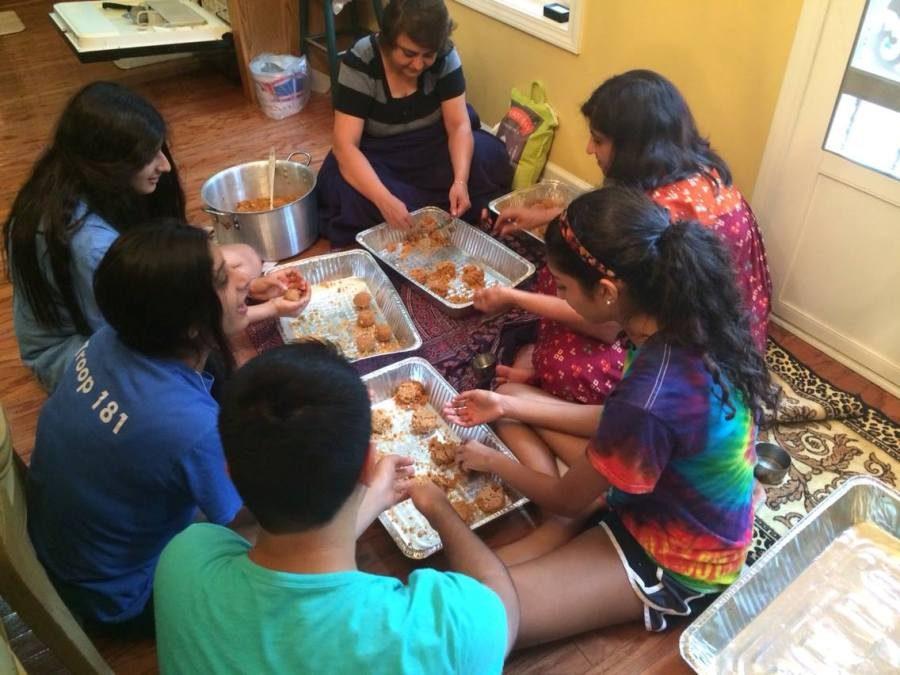Multilingual students
Increasingly multilingual students in an increasingly globalized world
Students embrace their culture and speak in their native language while making food at home.
December 16, 2016
In a world that’s becoming increasingly globalized, it benefits to be able to speak more than one language. People are realizing the importance of expanding their vocabulary in more ways than one and are beginning to teach and learn languages at an earlier age. The sooner someone is exposed to a language, the easier it is for them to pick up on.
It used to be that if an American child wasn’t raised in a multilingual home, the extent of their knowledge usually ranged from uno to diez. However, more and more parents are starting to teach their children languages at a younger age. Children go through a critical period in their development in which it’s easiest to learn and become accustomed to a language, so introducing them to multiple languages as soon as possible is the best way for them to become multilingual.
For example, in Utah, 20% of all public schools offer the opportunity for student to take half their classes in English and half in Spanish, French, Mandarin, or Portuguese.
Middle schools and high schools are responsible for the spread of language as well. Middle schools usually offer an elective or maybe a full year course of a language for the older students. High schools, however, require at least two years of a foreign language in order to graduate; that way everyone is exposed to a language different than their native one. The problem with this, however, is that some students don’t expand their knowledge beyond those two years and simply take the class for the credit, not the skill.
While some students underachieve in terms of language, others overachieve, taking up to level four and even AP classes of languages including Spanish, French, German, Latin, Chinese, and Sign Language among many others. Some students even take their learning outside of school and devote themselves to the language.
Senior Tim Hahn speaks German, English, French, and Spanish, and his goal is to get a degree in foreign language. Right now, he is planning on learning Italian, Japanese, Russian, Greek, and Macedonian as well. “Communications are essential for our world to function and give the world a sense of community,” Hahn said.
There are also the students who grow up in culturally diverse homes and are raised speaking more than one language. Senior Aliza Ali speaks English, Hindi, and Spanish, and understands Urdu and Gujarati. Her parents taught her English and Hindi from birth and introduced her to Urdu and Gujarati. She learned Spanish in elementary school and high school, taking classes all the way up to level 4.
“I think it made me unique and it helps me reach out to people,” Ali said. “I think it shaped me [to] look at all situations from different perspectives.”
Senior Monica Gonzalez speaks English, Spanish, French, German, and Italian. She learned English and Spanish growing up and German when she lived in Germany for a few years. She learned Italian by using her knowledge of Spanish, which is a similar language according to Monica. She learned French by taking four years of classes throughout high school.
“It’s definitely helpful and beneficial especially for my job,” Gonzalez said. “I can help customers who don’t have the best English to communicate what they are trying to say to others.”
Becoming multilingual clearly helps when traveling around the world, but it’s beneficial in many more ways than vacation. Language brings people together and helps families, friends, and strangers communicate all around the world. Language is a part of culture; it’s a part of who you are. The more languages you know, the more people you’ll be able to interact with, the more connections you’ll be able to make.
Being able to speak someone’s language means being able to have a sincere conversation with them. You can learn things you’d never hear in your native language from people you would’ve never been able to talk to without learning how.
Language can also open up a number of job opportunities. The world needs translators in terms of business and finance. International alliances and business deals require people to know multiple languages in order to accomplish anything. Even everyday shops and especially hospitals need people who are multilingual.
Other than communications, however, being multilingual can overall increase a person’s intelligence. According to Gray Matter, writer for the New York Times, learning multiple languages “can have a profound effect on your brain, improving cognitive skills not related to language and even shielding against dementia in old age”. In fact, it’s been scientifically proven that people who are multilingual are less likely to develop Alzheimer’s disease.
Matter also says that being multilingual “forces the brain to resolve internal conflict, giving the mind a workout that strengthens its cognitive muscles.” According to research, multilinguals are “more adept than monolinguals at solving certain kinds of mental puzzles.”
Keeping up with multiple languages in one’s mind helps people balance ideas and interpret information on a deeper level. Constantly switching languages keeps the mind involved and active with each conversation.
Speaking in different languages means different kinds of expression. According to Gabriela Kruschewsky of the Huffington Post, “some words just plain don’t exist in other languages, which at the very least means different ways of expression depending on the language [one is] speaking.” Apparently, you can talk in different ways in different languages and can take on a whole new meaning entirely.
The world is changing rapidly and communication is key to making and understanding those changes in order to move forward. Language is a beautiful, essential, part of learning and living and everyone should try to experience it in more ways than one.









Madeline Rodriguez • May 26, 2018 at 8:55 am
Well written article. Thought provoking. Learning a second language is an advantage to our students and will make them very competitive in our Global economy. Language goes together with the culture of the speakers of the language. Expand your knowledge and enjoy your experience while you become a Global Citizen.